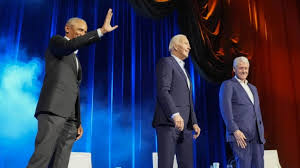by Joseph Shieber

Two of the happy discoveries I’ve made in the last two months or so are Brian Klaas’s and Dan Williams’s Substacks. Klaas is an American political scientist who has made his career in the UK, while Williams is a UK philosopher. Both writers have overlapping interests — chiefly, perhaps, in the role of tribal signaling in the formation of political beliefs.
I generally find myself in agreement with much of what both Klaas and Williams write. For this reason, it was significant for me to read posts by each of them, within days of each other, that I found deeply wrong. Both posts circled around the topic of the impoverishment of public discourse, though each post approached the topic from a distinct perspective.
Klaas’s post, “The Death of Serious Politics,” decries the way in which politics “has become subsumed by scandals, outrage, discussions of rhetoric, culture wars, and, above all, focusing on who’s winning and losing at politics rather than who’s winning or losing at solving problems.”
Klaas rehearses the typical candidates for blame. He claims that “We’re governed by narcissistic political influencers who trade in the currencies of eyeballs and clicks, rather than measuring their acheivements by, say, children lifted out of poverty.” He laments “how many of our collective brain cells have been commandeered after being poisoned by Trump’s hateful venom.” He also targets “the full-blown, profit-seeking news industry embedded within the frenetic pace of American life.” Finally, he blames us — “media consumers with digitally shortened attention spans,” and “dopamine-addled consumers of snippets of information.”
Klaas, then, begins with the observation that our public discourse is impoverished and then provides a diagnosis: our politicians are vapid influencers, Trump has coarsened the discourse, the media is profit-driven and — because of this — focused on driving ratings, and we the media consumers only pay attention to superficial factoids, rather than substance.
As it so happened, a few days before Klaas published his post, Dan Williams published a post discussing the fact that “In politics, the truth is not self-evident. So why do we act as if it is?” Although the topic of Williams’s post might seem orthogonal to Klaas’s, the two are actually quite closely connected. To appreciate this, let’s first see what Williams has to say about what he sees as a “harmful delusion” that many people harbor about their political beliefs.
Williams begins by highlighting the overwhelming evidence that “the political beliefs we develop are highly fallible.” Williams argues, however, that most people fail to treat their beliefs as fallible; rather, “many treat their political beliefs and preferences as self-evidently correct.”
Williams suggests that, in treating their beliefs in this way, these people adopt naive realism with respect to their political beliefs. The problem with this is that naive realism is not just a mistake, but a harmful mistake:
Because people are naive realists, they tend to think the solutions to political problems are self-evident. This causes lots of bad politics and drives popular support for demagogues who promise to force through “obvious” policies. Further, if the truth is self-evident, people who deny the truth must be either liars, stupid, or crazy. This view is of course ubiquitous in political debate, from conservatives who dismiss progressives as victims of a “woke mind virus” to liberals who view conservatives as victims of “misinformation” and “post-truth.”
This, then, is the way in which Williams’s post links up with Klaas’s. Williams suggests yet another cause of our debased political discourse: that too many of us subscribe to naive realism about our political beliefs.
Taking Klaas and Williams together, we now have five explanations for the emptiness of public discourse: politicians, Trump, the media, our dopamine-driven attention spans, and our naive realism about political beliefs.
Unfortunately, Klaas’s and Williams’s discussion of the problem of political discourse, though based on a largely accurate view of human cognition and the way that it can be warped by tribalism, is completely skewed in a way that obscures the greatest influence on the impoverishment of contemporary political discourse. Both Klaas and Williams write as if the problems besetting public considerations of politics are “our” problems, shared equally by all participants. That is, both Klaas and Williams borrow heavily from the “both sides” trope – although Klaas does single out Trump as one of the causes of the debasement of political discourse (more on this in a moment).
There are two problems with the “both sides” trope in the case of attempts to explain where our political discourse has gone astray. The first problem is that it is not grounded in fact. The second is that it obscures the genuine source of the unseriousness of public discussions of politics.
Let’s look at the first problem – that the “both sides” critique of the impoverishment of political discourse is not grounded in fact – point by point.
Is Klaas right in suggesting that “politicians” are all unserious “influencer” types? Consider Joe Biden. Considering only Biden’s legislative accomplishments, it would be hard to assess those as unserious. Biden passed a $1.2 trillion infrastructure package, the first new gun control legislation in 30 years with the Bipartisan Safer Communities Act, the Inflation Reduction Act of 2022, which included over $350 billion dollars for investments to deal with climate change, passed the American Rescue Plan to deal with the economic impacts of Covid, leading non-supervisory worker salaries to soar and child poverty to plummet, passed the PACT Act to address the effects of military service members’ exposure to burn pits and other toxins, and signed the CHIPS and Science Act, to support the production of semiconductors in the United States and to reduce US reliance on Chinese hi-tech manufacturing. Writing in the LA Times, Jackie Calmes assessed that “Biden has the best legislation record of any president since LBJ.” That is hardly the record of an unserious politician hunting for likes on social media.
What about “the media”? It is simply false that all media sources are equally unserious. In fact, Fox News is an outlier: in its popularity, its negative influence on its viewers, and its unseriousness.
Nor is it true that all media consumers are equally dopamine-addled. Consider the comparison of extreme right- vs. left-wing social media users – who between them are responsible for more than 50% of the fake news shared on Facebook and former Twitter. One study found that the extreme right-wing social media users were responsible for 1 ½ to 2 times more fake or misleading content than were the left-wingers. Indeed, a different study found that, in particular, those who promoted false information belonged to “a smaller subset” of conservatives “who also share two psychological traits: low levels of conscientiousness and an appetite for chaos.”
What about Williams’s suggestion that naive realism is “ubiquitous in political debate, from conservatives who dismiss progressives as victims of a ‘woke mind virus’ to liberals who view conservatives as victims of ‘misinformation’ and ‘post-truth’”? Note first that it is in fact true that conservatives – or at least an identifiable subset of conservatives – are victims of misinformation, due in no small part to the demonstrable effects of Fox News.
Indeed, even Christopher Rufo – himself an arch-conservative – recognized recently that there is “a problem on the Right. The economics of online discourse are increasingly at odds with forming and mobilizing a successful political movement. … Kanye-style antisemitism, right-wing identitarianism, online grifting, extreme conspiratorialism, etc. None of these are right on the merits and they are a threat to a functional, popular conservative movement.”
In contrast, it is simply false that the most prominent figures on the left are victims of a “woke mind virus.” Indeed, the same Christopher Rufo has admitted that such accusations are themselves propaganda to tarnish the reputation of Democrats with voters. In a series of tweets in 2021, Rufo revealed the game: “We have successfully frozen their brand — ‘critical race theory’ — into the public conversation and are steadily driving up negative perceptions. We will eventually turn it toxic, as we put all of the various cultural insanities under that brand category. The goal is to have the public read something crazy in the newspaper and immediately think ‘critical race theory.’ We have decodified the term and will recodify it to annex the entire range of cultural constructions that are unpopular with Americans.”

What about Klaas’s suggestion that Trump is one of the factors in the debasement of our political discourse? Doesn’t this at least show that Klaas’s analysis isn’t completely marked by both-sidesism? I don’t think so.
Blaming Trump means, at the same time, exculpating the Republican Party more broadly. That Party, however, is not merely enabling Trump. As Rich Perlstein has convincingly argued – perhaps first in his 2017 NY Times piece “I Thought I Understood The American Right. Trump Proved Me Wrong”, and more recently in his series of essays for the American Prospect – Trump is best described not as a hairy, orange-tinged excrescence upon the body of the Republican Party, but rather as its black, beating heart.
So Klaas’s and Williams’s both-sidesism is wrong on the facts: it is not the case that broad trends involving politicians, the media, dopamine-addled consumers, or naive realism have contributed to the debasing of our political discourse. Instead, it is the debasement of the Republican Party that has led to the evaporation of political discourse within that party. Recall: in 2020, the Republican Party was so bankrupt of ideas that it declined to pass a platform at all!
Contrast this with the left. If you read popular liberal to left-wing journalists and bloggers, from Noah Smith or Matt Yglesias or Kevin Drum to Jacobin or Current Affairs, you’ll find no shortage of deeply researched discussions of a wide range of substantive policy questions.
In other words, it is simply false that public discussions of political questions are debased; rather, Republican discussions of political questions have virtually disappeared. Given the structural problems with American political media, this also explains the lack of substance of American media coverage of politics. That coverage depends on the appearance of “balance.” If only Democrats are engaged in substantive political work, the media cannot cover that work at all – to do so would be “unfair” to the other side. So the media retreats to covering the aspects of politics in which both sides are engaged – social media presence, fundraising, and so on. This presents the distorted image that this is all that both sides are doing, which is a mistake. Democrats build; Republicans tear down.
This, then, is the deeper problem with Klaas’s and Williams’s both-sidesism. It obscures the fact that the ultimate cause of the debasement of contemporary political discourse is the debasement of the Republican Party. It promotes the fiction that we are all to blame, when in fact we are all the victims of a rot that began in the Republican Party many decades ago, a rot that may yet prove fatal to American democracy.
